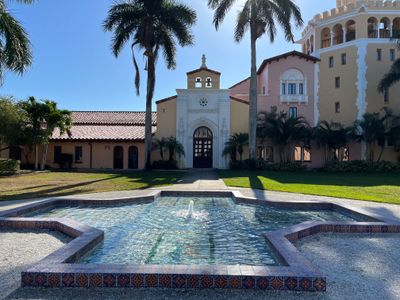This is part of Justified‘s Travel series, where NUS Law Students chronicle their experiences on exchange. This week, Kok Yee Keong (Year 3) shares about his time at Bucerius Law School in Hamburg, Germany, in Semester One.
***
I had the good fortune to attend an International Exchange Programme at Bucerius Law School in Hamburg, Germany, and I daresay it was the best decision I have ever made in my life.
Here are 5 things one should do on exchange!
1. Explore Like There Is No Tomorrow
The sole purpose of an exchange is to TRAVEL (aka “broaden your horizons”). Even NUS encourages you to do so – it freezes your CAP and only requires you to pass your modules while on exchange. Furthermore, being a NUS Law A-sian allows you to mug less and travel more — in fact most of us travel every other weekend. So explore like there is no tomorrow! This is probably the only time in your near future (other than perhaps a Grad Trip) when you can truly take a good long break from the rigour of school and life.
Visit all the places that you have seen/heard on television and textbooks. Here are some of them!

Colosseum in Rome

The Leaning Tower in Pisa, Italy

Rhine Falls in Switzerland

The Magnificent Swiss Alps

London’s iconic Guards, Telephone Booth, Big Ben, Supreme Court (House of Lords) and Musicals!

Windmills in Amsterdam

Oktoberfest in Munich, Germany
While travelling can be expensive, try not to short-change yourself just because of this. Look at it this way: Law school has 100% employment rate and our average pay is 4.5k. So the money you spend on exchange can easily be earned back with a few months of work! Besides, it’ll be next to impossible to find an opportunity to travel like this when you begin working. So this is really THE time to travel.
2. Eat All the Delicious Local Specialties
Obviously, other than snapping photos, tasting the local delights of every city is a MUST DO. Here are some yummylicious photos to make your nus-pines-and-canopy-plagued-life miserable:

Paella from Spain

Rosti from Switzerland

Luini Panzerotti from Milan, Italy

Currywurst from Germany

The real fastfood from a box in Amsterdam, Holland
3. Make your exchange MEMORABLE.
An exchange is a once in a lifetime opportunity, therefore you should try to make it memorable. Here are some ways:
i. Do Stupid Things
ii. Send a postcard home from every city you visited

iii. Drink one bottle of beer a day (especially if you are in Germany where it costs less than 1EUR/bottle)

Achievement Unlocked
iv. Be FASCINATED by the SNOW: draw harmless graffiti on people’s car, engage in snowball fights, eat ice-cream while topless in the snow, make snow-angels.

4. BE THANKFUL FOR WHAT YOU HAVE BACK HOME
Besides having fun, the exchange programme gives one the opportunity to be thankful for what you have back home.
After a few months on exchange, your palates will start to crave for Singapore food. It gets so bad that your mind always wanders off thinking about food in class. That was what happened to me and one day during class I began comparing the number of dishes I can think of in 1 min:
Germany: Kebabs, Pork Knuckles, Sausages, Schnitzels, BEER.
Singapore: Char kway teow, chye tow kway, chill crab, bbq chicken wings, prawn mee soup, hokkien mee, sambal stingray, yong tau fu, chicken rice, roasted duck rice, braised duck rice, bar chor mee, roti prata, murtabak, rojak, ice kachang, kway chup, mixed rice, ban mian, fish soup, ayam penyet, bak kut teh, or lua, sugarcane juice, bandung, satay, laksa, lor mee.
Singapore wins hands down.
On a more serious note, after you have seen the world (or Europe at least), you will start to truly appreciate Singapore (and stop behaving like the typical Singaporean who complains about everything).
For example, think the trains in Singapore are packed? Think again.

The trains in Rome come every 10-15mins. Sometimes they don’t come at all. And when the train arrives, it is packed like sardines — but that doesn’t stop the army of commuters outside from pushing their way through. Hard pushing and shoving (far more intense than the kind we experience during peak hour in Singapore) is not only expected — it is a way of life.
Are you bored of home-cooked food? Well, wait till you are sick of Frozen Pizzas on exchange.

Other random points:
- In Madrid, I lost my camera just by placing it on the seat beside me for 5 minutes while having lunch. I bet you my camera that this wouldn’t happen in Singapore.
- You have to pay 0.50 EUR (75 cents) to use the public toilets and they are not even half as clean as some of the toilets at our MRT stations.
- You have to pay 0.30 EUR (50 cents) for a packet of sauce at the fast food (okay maybe this is not that bad considering I just learnt upon my return that curry sauce at Singapore’s McDonalds costs 30 cents).
Of course, life abroad is certainly exciting with many more things to do and explore than in Singapore. But having seen the world, if I have to choose one place to live in permanently, it would still have to be Singapore (did you not see the above list of Singaporean dishes I thought of in 1 min — how can one resist that?!?!)
5. OTHER MORE USEFUL TIPS AND ADVICE
- PLEASE BRING PRIMA MIX OVER. Your usual flavours such as Chicken Rice, Bak Kut Teh or Gong Bao Chicken. Over there, you’ll miss Singapore food so much that Prima Mix becomes your best friend. Any other Asian condiment bought from overseas can’t compare to it.
- Try to travel in a group for obvious reasons of safety and cost-saving. More importantly, when you travel together over the weekends, you can rent an apartment on www.airbnb.com at very affordable prices but for a very cosy and comfortable place.
- Don’t only hangout with Singaporeans, try to mix with the exchange students — after all that’s the whole point of an exchange: to interact and immerse yourself in a different culture. Also, for a more practical reason, these exchange friends will usually offer their places back in their home country which comes in handy when you do your post-exchange Euro Trip!
- Buy train and plane tickets in advance for your weekend trips, there are substantial discount for early birds. Usually the national trains of where you are travelling to are cheaper. Sometimes there might also be an option for overnight buses. For flights, Use www.skyscanner.com.sg to search for the cheapest airline.
After close to 6 months, spending over $17,000 at over 25 cities, the International Exchange Programme has changed my view of the world and of the people around me. I have made the fondest memories over there and I would not trade anything in the world for it — not even a TC. Therefore, I strongly encourage everyone to make full use of the NUS opportunities to go abroad — be it on a semester exchange or summer programmes or even field trips!






